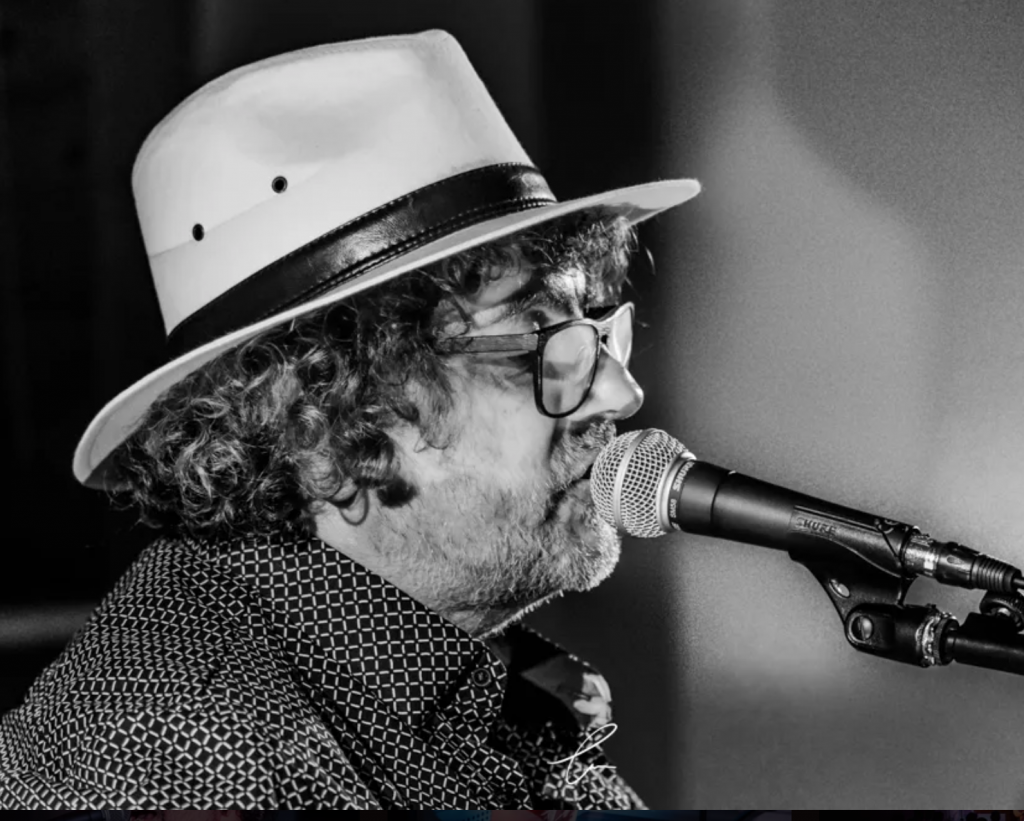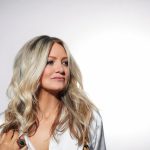We have been saying for a while at the magazine that we will be talking to Norfolk-based folk artist Ervin Munir about his new album “Broken Compass” soon, and so with the album release date set for December 8th, we jumped at the chance to set up a meeting!
The album has ten tracks, four of which are unreleased and can be obtained directly from the artist website, as well as from the main streaming platforms.
The album has been in development since August 2022, when Ervin joined up with producer Aeron Z. Jones. Aeron produces and plays bass, electric, and lap steel guitar on the album, while Ervin performs vocals, harmonica, acoustic guitar and piano. We have reviewed some of the singles here at the magazine, “Fall Apart” and “Pick Up the Phone,” among them, and Ervin certainly has a few musical twists in his backpack.
Lyrically, the album reflects on the last seven years for Ervin, and the tracks are often autobiographical and reflective of the world going on around him as he observes Norfolk life.
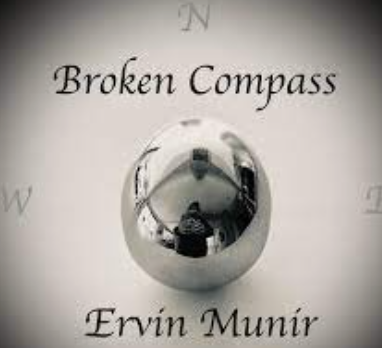
We began the interview by asking for a bit of background on the album as a whole.
Ervin: I collaborate with the accomplished producer, Aeron Z. Jones, mostly working in my own studio. Together, we immerse ourselves in the meticulous process of production, with Aeron dedicating several days to mastering and refining my compositions. The venture holds great significance for me, representing an important milestone in my musical journey. While I’ve previously released singles, creating an entire album posed a big challenge that I am proud to have surmounted.
We noted the value of singles for artists in the streaming era, where artists can avoid the lengthy time in studio and keep the interest high with single releases that won’t go on physical sale like the old 45” vinyl.
Ervin: To some extent, my perspective aligns with yours. Since October of last year, I’ve maintained a consistent release schedule, unveiling singles every two months. This left me with some songs ready for release in reserve. When crafting the album, I strategically incorporated some of these songs.
This allowed me to strike a balance between releasing singles and presenting a cohesive album. In recognizing the challenges of defining albums in the streaming era, I invested considerable thought into song selection and sequence.
The album is a carefully curated representation of my musical identity, playing not only singles but also piano ballads, which I typically play on guitar during performances. The tracks traverse genres, from Americana to a fusion of folk with a subtle touch of pop.
My inspiration to create an album is drawn from the era of album-centric bands like Yes, Crosby Stills, Nash & Young, and Pink Floyd, whose albums left an indelible mark on my life, fostering a deep appreciation for the artistry inherent in cohesive musical journeys.
With the album, we wondered if the running order fell into place naturally or whether there was some playing around with the order.
Ervin: I did play around with it. The last song on the album, for example, is an orchestral piece that is quite dramatic. I felt it was the right song to end with. With the running order, I put most thought into building toward the end of it and what impression I wanted to leave people with. But I do wonder, with streaming, how many people play whole albums now. I think I play them more in the car on a trip.
We think the decision not to place CD players in cars any more has a detrimental impact on that. When people had CDs (and long ago tapes), then they played albums, but now they stream their play lists from the phone, a significant shift in the way we listen.
Ervin: I have seen some articles saying similar things. People create playlists, but they are from various artists. Yet, they have similar connections to albums, as they will retain the order even when on shuffle, so you can sense the song that is coming next. Also, we all have some albums that we love and that remind us of things; some albums take me right back to my school days. Even in school, when all we had was vinyl, people knew the song that was coming up and would be ready with pencils to drum along to it! At home, I was brought up in a more classical tradition; my dad banned pop music. And when I was in sixth form, I was on a committee, and they had some money and a vote on what albums to get for the record player. I remember voting for great war film themes and maybe a Disney record, as that is what I listened to at that time. I recall enjoying Simon and Garfunkel as well, but everyone else regarded me with contempt. But we ended up with Santana, Pink Floyd and Carole King.
Talking about folk music, folk music has its influences in older narratives and styles. Yet Ervin, as he notes, is musically touching on softer rock and Americana. How does he see his style on this album? It’s not traditional folk, even if we have often described him as a folk artist.
Ervin: I am an artist. I don’t think about genre when I write a song. “Broken Compass,” the lead track on the album, was a folk-style song with fingerpicking on guitar. But when we recorded it, it became more rocky, and I liked it that way. I play with a lot of folk groups in Norfolk, and the important aspect is the narrative story behind the music. I try to tell a story with each song. Also, as another artist came up to tell me recently, it is the instrument that can make a song folk. He was saying that he liked how I did a song live, and it worked as a folk-style number. But as an artist, when you submit your music to be listened to, they always ask for the genre, and I struggle with that. But I do feel that I am more under the folk umbrella. But it is modern folk; I hate the ‘hey-nonny-no’ type of folk when the lyricist seems to get bored and lacks a word or two.
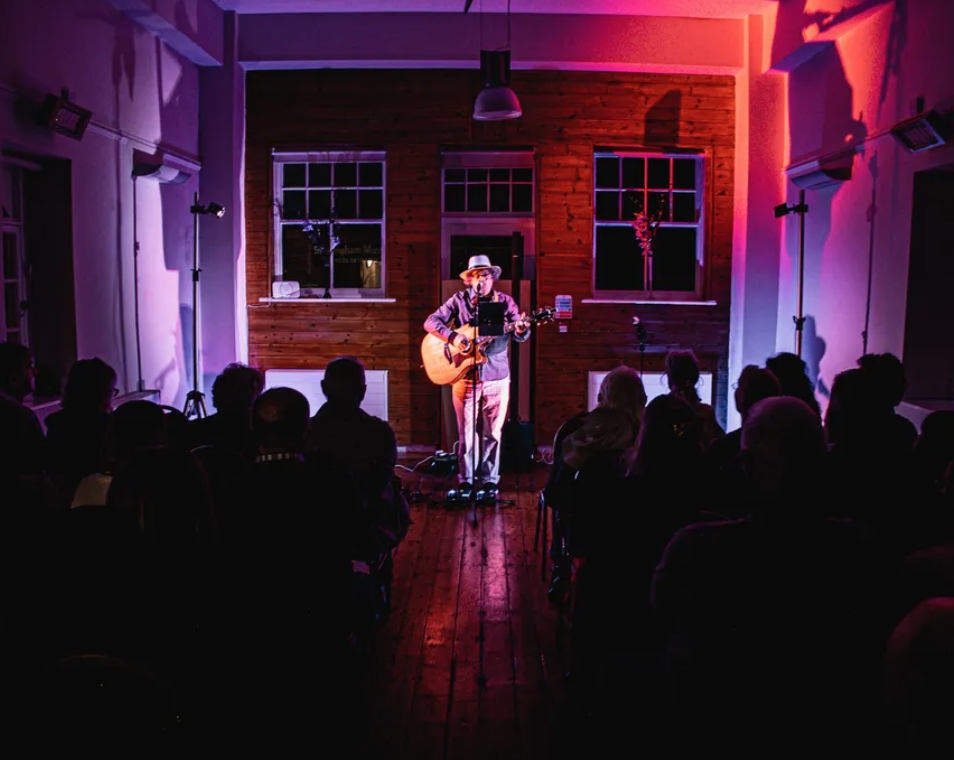
One thing we noticed was that Ervin had been recording at the legendary Abbey Road Studios. We wanted to ask about that, as he has his own studio, but it must have been a great experience.
Ervin: I am a member of a songwriters group called “Talent is Timeless” (an age-positive, 50+ songwriters group). They run courses, and there was a course called ‘create and release’ that takes you from the point of having the song up to release. It lasted about six months, off and on. As part of this, they offered a session at the Camden Club in London to play the single on the day of release, with all of us releasing on the same day. They also offered the option to record at Abbey Road, as apparently you can’t book a studio there for less than two days, so its quite expensive. So they booked it out and offered it to us. I never did the crossing, but when I was standing on the steps, all these tourists were taking pictures of me, and I thought how disappointed they would be when they got home! It was a good experience, and I recorded “Carolynn” there. I sadly got COVID that day (although I didn’t know it then), and I was existing on Day Nurse, so my memory is not entirely positive! I also had a gig that evening, and I struggled badly the whole day. But I took the two tracks back here and continued working on them. The thing is that there you are singing into a £10,000 microphone, and you realise the mic costs as much as your studio!
Which brings us onto asking about songwriting and how Ervin goes about it, whether he writes with piano or guitar?
Ervin: I occasionally collaborate with other writers, but I wrote each and every song on the album. I can be anywhere, and an idea will just come into my head. I will then head into the office when I can and start playing around with some chords. The last single and the last song on the album, I just had an idea of a sound for the piano and just built around the riff. The piano can have a very different way of writing it; on the guitar, I can fall into old habits of playing the chord sequences I like, but with the piano, sometimes I will just put my hand on it and a sound comes out, and I don’t even know the chord! I will just work it out from there.
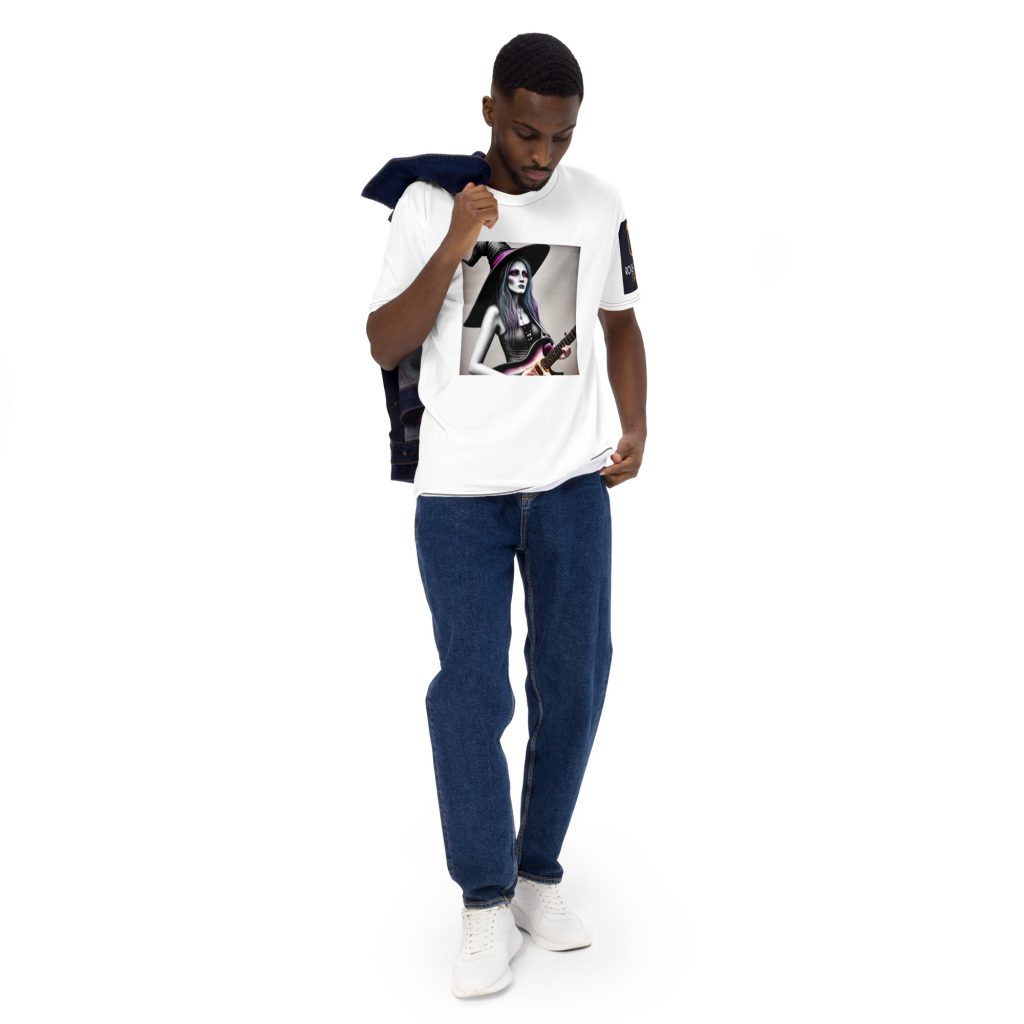
(check out our merchandise, https://rockthejointmagazine.com/merchandise/)
And if someone was just browsing the magazine here and was reading this article, which of your songs would you recommend they check out first to get a feel for your sound?
Ervin: I would suggest “Broken Compass,” the title song from the album, as a good starting point. I do have a social justice hat on as well, and there is a blues track as well called “Fall Apart,” which is about what will you do when the walls come down? Will you build them again? That is more of a protest song, and it does show how I feel about the world. But, in terms of my music, the one that gives the best impression is “Broken Compass.” But I’m writing stuff all the time, and I already have five more tracks that I’m working on now that are strong. Further, I’m working on developing my songwriting all the time. I went on a retreat recently with Boo Hererdine. He’s written for a number of artists, and he was giving us ideas. It is good to refresh approaches. I’m learning a lot of form and structure, but I don’t want to be too constrained.
And to finish with, what album was the last one you heard, and did you enjoy it?
Ervin: The last album I listened to from beginning to end was Yes, with “The Yes album.”. Even though it is not the type of music that I compose, tracks such as “Yours is No Disgrace” from that album continue to captivate me.
And with that, we end our interview with Ervin. He is a really interesting artist with some great tracks to explore, and he’s quite active on the live circuit too, around the south of England. We hope to see the new album consolidate him in the Americana and folk markets.
By Mark C. Chambers
and
Lorraine Foley
We hope you liked the feature. We work hard for you all and put a lot of effort into getting great reviews and articles up for your enjoyment. As a thank you to us, please do buy us a coffee by using the donate link below! We appreciate it. Also, while here, please check out our other features, reviews, quizzes and poetry!
